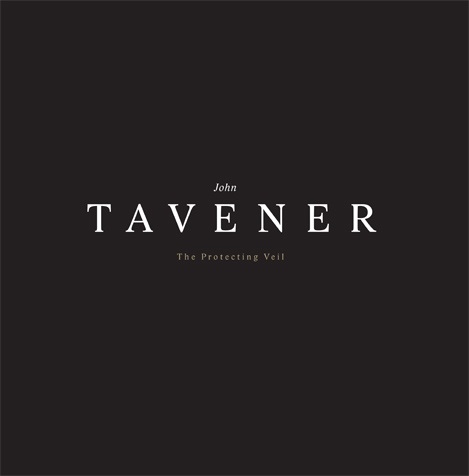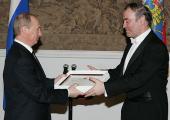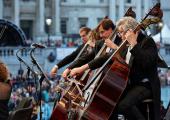Reissue CDs Weekly: John Tavener

Definitive new edition of the reflective The Protecting Veil
 John Tavener: The Protecting Veil
John Tavener: The Protecting Veil

 John Tavener: The Protecting Veil
John Tavener: The Protecting Veil

This concert brought to a close the London Symphony Orchestra's focus on Scriabin, in a series appropriately titled "Music in colour". The Third Symphony was partnered here with Messiaen’s early work Les offrandes oubliées and Chopin’s Second Piano Concerto – both in their own way richly colouristic works.

The Tchaikovsky de nos jours, is Theodore Gumbril’s dismissal of Skryabin in Aldous Huxley’s Twenties novel Antic Hay. For some reason, Alexander Skryabin has suffered more than most from snap judgements of this kind. He has been the woolly theosophist, the vacuous, over-inflated mystifier, the effete, self-indulgent decorative – everything except the refined, disciplined creative genius. It’s high time these images were consigned to the rubbish dump of history, along with the dull-witted Bach, the mad Beethoven, and for that matter the slushy Tchaikovsky.


An all-British programme – with plenty of Italian flavours – opened to a sold-out Barbican Hall with the overture In the South (Alassio), composed by Elgar during a stay on the Italian Riviera. It isn’t one of his most memorable scores, but it still provides plenty of interest with typical Elgarian exuberance, an unexpected martial episode (imagining the Roman army), and a muted viola solo. It flits from scene to scene like a holiday scrapbook, and Antonio Pappano handled the fluid tempo and dynamic changes with aplomb.
There were, it seemed, enough trumpets to serve Gabriel throughout eternity - and, as fanfares go, this one was stretching a point and then some.

The alpha (Schubert) and omega (Mahler) of Austrian romanticism made for a musically satisfying pairing as the London Symphony Orchestra resumed normal service after its recent Gergiev-Berlioz marathon. Buoyed by the contrasting delights of a sprightly symphony and a weighty song-cycle, the spring was back in the musicians' collective step as they played as one for their principal guest conductor, Daniel Harding.
Following theartsdesk's Monday opinion piece on reasons for moving towards a boycott on Valery Gergiev's concerts, and in the general climate created by other reports and protests, the conductor has issued the following statement, to which David Nice responds with an open letter.
Valery Gergiev's statement

Last Thursday I was giving a talk before a concert in Birmingham, decently but not inspiringly conducted by the much-liked Vasily Sinaisky. Had I been in London I could have taken my pick between two greater interpreters, Valery Gergiev launching his Berlioz series with the London Symphony Orchestra and veteran Yury Temirkanov returning to one of his standard programmes with the Philharmonia.

Berlioz wanted to make the first arrival of his demon onstage unforgettable, with an extreme sound effect - violins and violas marked sul ponticello, strettissimo, starting fortissimo, with interjections from three trombones snarling in minor seconds. In last night's performance of La Damnation de Faust that moment was glossed over. It flashed past as if it had never happened.